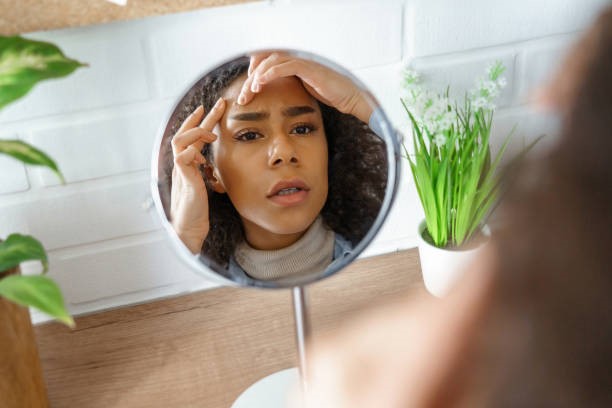AN-Routine de soins peau à tendance acnéique
Acne-prone skin care routine

Acne is a fairly common skin condition that is a disorder of the hair follicles and sebaceous glands. The sebaceous glands secrete oil (sebum) to keep the skin hydrated. When the glands become clogged, this can lead to pimples and cysts. Clogged pores, excessive sebum production, bacteria that trigger an inflammatory response, hormonal changes and even diet can all contribute to acne formation.
Day
| Cleanser | Cleanse the face twice a day. It is best to start your morning skin care routine with an oil-free cleanser containing salicylic acid or antibacterial active ingredients such as sulphur and avoid using abrasive exfoliating sponges or brushes to minimise skin trauma and inflammation. |
| Toner | Use a toner that contains both salicylic acid (BHA) and glycolic acid (AHA) to help remove dead skin cells and oil that can clog pores and make skin look dull. |
| Serum | Look for ingredients like salicylic acid and tea tree oil to keep your skin clear. Azelaic acid also helps kill bacteria, exfoliate dead skin and brighten skin tone. |
| Moisturising cream | Moisturising your skin is an important final step in your morning routine because the lipids, or fats, in the upper layers of the skin help to retain moisture and create an impermeable barrier between your skin and the environment, Ignoring this step could leave skin dry, vulnerable to infection and/or dull in appearance. Look for non-comedogenic products which means that the product is less likely to clog pores and contribute to the formation of acne papules. |
| Sunscreen | Definitely look for zinc oxide sunscreens with at least SFP 30, as they will leave your skin with a more matte finish. Plus, it’s a natural antibacterial and ideal for those prone to rashes. |
Night
| Oil-based cleanser | This is a step you can skip even though there are makeup remover oils suitable for all skin types. Jojoba oil and grapeseed oils are better options for acne-prone skin as they are both non-comedogenic (won’t clog pores) Rich in vitamins A, E and D, as well as antioxidants and fatty acids, jojoba oil heals the skin while removing stubborn products like waterproof mascara |
| Water-based cleanser | For people with severe acne, you should stick to cleansers with active ingredients Alternatives to acne cleansers are mild cleansers and micellar water |
| Toner | Use a toning lotion containing niacinamide which is an anti-inflammatory |
| Serum | Look for ingredients containing retinol to be used only in the evening. Be careful not to use multiple acids at the same time. Alternate with moisturising products such as niacinamide and hyaluronic acid. Retinoids work to prevent acne by regulating or normalising the cell renewal process, which prevents clogged pores and breakouts from forming. |
| Moisturising cream | Look for moisturizers that contain a retinoid derivative and hyaluronic acid, a humectant that draws water molecules to the skin. |
| Oil | Avoid oils other than non-comedogenic ones. |
| Advice | No acne treatment works immediately or overnight. Use a product for at least 8 to 12 weeks before deciding whether it helps or not, unless the product causes skin irritation or a rash, in which case stop using it. Also limit the number of products used as too many products can cause skin irritation and worsen acne or potentially clog pores. Adult acne can also be a symptom of other health problems, such as polycystic ovary syndrome (PCOS). If you think your acne may be the result of an underlying condition or is not responding appropriately to over-the-counter treatments, you should make an appointment with a board-certified dermatologist. |
